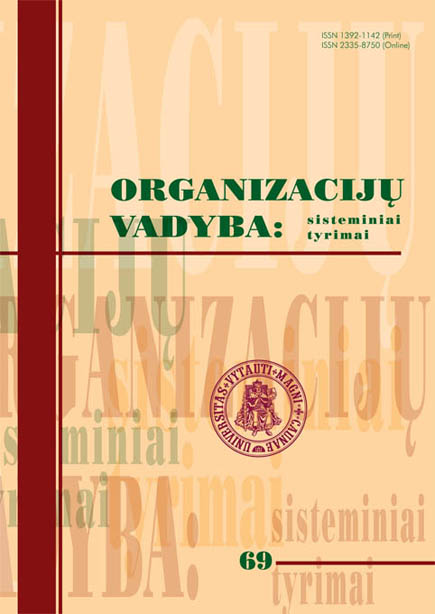Lean organizacijų evoliucija
The evolution of Lean organizations
Author(s): Darius Ruželė, Dalius SerafinasSubject(s): Economy
Published by: Vytauto Didžiojo Universitetas
Keywords: Evoliucija; Organizacijos; Vadybos metodai; Lean; Evolution; Organizations; Managerial tools; Lean
Summary/Abstract: Remiantis evoliucijos tyrimų modeliais bei autorių sudarytu evoliucionuojančios organizacijos modeliu, straipsnyje analizuojama Lean vadybos metodologija ir tiriama, kaip evoliucionuoja ją įgyvendinančios Lietuvos gamybinės organizacijos. The purpose of this paper is to examine the evolution of Lean organizations. Design/methodology/approach: a conceptual literature on the evolution of species, organisms and organizations was reviewed and an original model (framework) of the evolution of organizations was constructed. The model was structured to explore abilities of organizations to receive, store, transform, utilize in practice and transmit information as well as to analyze a flow of the internal and external feedback information. Using this framework, a thorough literature research concerning Lean implementations was conducted and the results of these implementations, followed by an empirical qualitative study of 8 manufacturing Lean organizations in Lithuania, were analyzed. Findings/conclusions: a metaanalysis of Lean implementations disclosed that Lean organizations are paying thorough attention to collecting both external and internal information. They are practicing dissemination and standardization of vulnerable intrinsic information, making this information a part of an organizational culture and making it safe. While organizing the exchange of information with business partners, Lean organizations haven’t achieved much success mostly because of the two problems – problems in creating shared information systems and lack of support and initiative from potential collaborating partners. Lean organizations usually reacted promptly and effectively to failures and errors at the workplace. Proactive evolution of Lean organizations was closely connected with innovative proposals of the empowered and motivated personnel. While handling with changes mature Lean organizations usually do not face hard resistance of the workforce. Thus, the metaanalysis of Lean organizations reveals such systems, which are capable successfully to receive, store, transform, utilize in practice and transmit information. An empirical study disclosed that most of the researched organizations were actively collecting environmental (external) information. They shared information with customers and gathered feedback information, though in some cases this gathering was passive and reactive. Some of these organizations used to cooperate with business partners though most of the researched organizations were working mainly as independent stand-alone business entities. All examined organizations were promptly reacting to errors and failures and proactively creating preventive means. Lean methods related to the motivation of employees allowed them to foster product and process innovations. Most of the researched organizations were unimpressive while coping with changes possibly because of the lack of teamwork.
Journal: Organizacijų vadyba: sisteminiai tyrimai
- Issue Year: 2014
- Issue No: 69
- Page Range: 119-136
- Page Count: 17
- Language: Lithuanian

